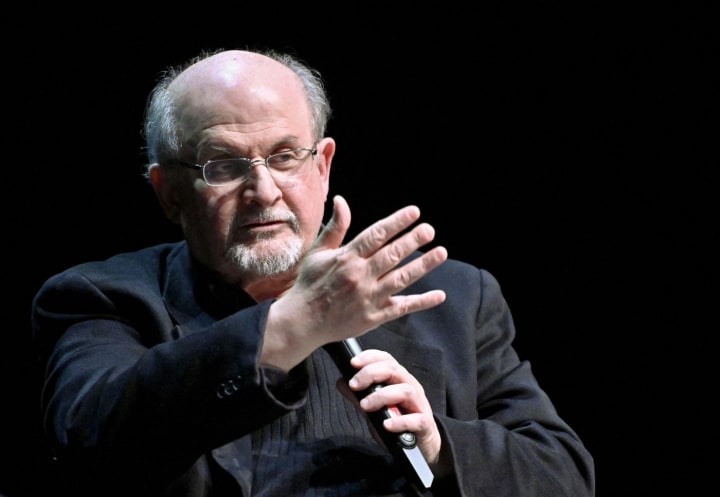Let Salman Rushdie’s Writing Tips Inspire You
WRITING ADVICE FROM SALMAN RUSHDIE

Salman Rushdie is a masterclass act
This is a story about coming close to Mr. Rushdie and sharing some of his well-honed advice for writers. I also share a private observation he made that has inspired me for decades.
Salman Rushdie being attacked took my breath away. Literally.
Rushdie, 75, was stabbed at least twice on stage at the Chautauqua Institution before he was slated to give a lecture. He was airlifted to a hospital in northwestern Pennsylvania, underwent surgery and was put on a ventilator. He will likely lose an eye, his agent said. The nerves in his arm were severed; and his liver was stabbed and damaged. The news is not good.
I’ve been a fan of his work ever since buying a first edition of the Satanic Verses many years ago.
And his Masterclass is wonderful.
It’s tragic what has happened and we are all stunned. The “other” news that has dominated our headlines this week have eclipsed Salman’s tragic event. The world is insane at the moment.

Cloak and Daggers
Only once did I interact with him. I was working for an A-list director in Hollywood when a meeting was set for my boss to meet Mr. Rushdie in NYC.
It was a bit cloak and daggers. This was in 1996. (As we have previously established, I’m old!)
Mr. Rushdie was staying at a hotel under a fake name which his team knew but which wasn’t shared. The location of the meeting would be announced only after my boss arrived at location A, which was the lobby of a hotel nearby to where Salman was staying.
The meeting went fine from what my boss later relayed. We (I’ll say we because I was his head of development) wanted to explore turning Satanic Verses or Midnight’s Children into a film. This was before limited series were all the rage. Years later, Salman would make Midnight’s Children, selling the rights to the novel for $1 and working on the adaptation himself (reducing over 600 pages into a two hour script!)
My boss could not wrap his mind around a way to make either book work, from his own perspective. He was aiming for more authenticity where Salman had, and has, a layer of fable woven into his approach.
Personally, I think my boss took the meeting more to understand how a man with a Fatwa on his head operates in the world. These are the kind of details that held interest for him. The real film that needs to be made is the one about Salman and his life.
Salman showed up with no body guards, no security, just himself. This was shocking to both of us, as he had a bounty on his head from the Fatwa that most people know about. That has been covered elsewhere, and isn’t the point here. Though, Curb Your Enthusiasm’s Fatwa episode, (Season 9, finale) which I thought was hilarious, I now find a bit bittersweet in light of the tragic event that now has Mr. Rushdie on a ventilator.
This is a regurgitation of the conversation:
I’m a big fan, big fan. (This was Salman to my boss)
Same here. Your writing has a fierceness that speaks to me.
Same.
Salman mentioned a couple of my boss’s films, but to keep things private, I’ll leave these titles out of the conversation.
They eventually settled in and had a conversation about inspiration, which is what I wanted to share.
Salman said this:
A novel is a tapestry, with bold colors and subtle hues woven together in a way that, we hope, presents something you cannot look away from. Tiny moments of the spectacular.
That’s it.
Tiny moments of the spectacular
I won’t add what I think this means, because I’ll only dilute his words with my analysis. Just let that phrase hang: Tiny moments of the spectacular.

Following are some amazing words from Salman that are elsewhere, but I thought collecting them here would be helpful and inspiring.
In Salman’s own words (from his Masterclass)
The only commitment a writer needs is the commitment of the seat of his pants to the seat of his chair. In other words, just sit down and do your work. Sitting down is really important. Sit down and don’t get up until you’ve written something.
I believe that there are two ways of writing really, really well. One you would call maximalist. And the other you would call minimalist. Minimalism would mean that you have a very tight focus on one beautiful strand of story, like one hair from the goddess of literature. And you turn it in the light. And you see how it catches the light. Very, very simple and pure piece of storytelling. That can be extraordinary.
At the other end of the spectrum, the maximalist spirit is one which tries to scoop up enormous armfuls of the world and try and put as much of the world as you can fit in there. Henry James used to call books like that, he used to call them loose, baggy monsters. In my view, they don’t have to be loose or baggy. And they’re not necessarily monsters. But it gives you a sense of what they’re like.
They’re encyclopedic books, books which try to be everything books. It seems to me that you can either write an everything book, or you can write a very pure simple something book. And the middle ground, to my mind, is less interesting. But you have to find your own ground. I’m just saying, think about those two extremes. Think about, which is your temperament?
Is it your temperament to tell a single pure story? Or to go with a wheelbarrow and try and scoop up the whole world and put it in your book? I mean, myself I have been more often on the maximalist than on the minimalist side. But some of the writers I most admire, like, for example, W. G. Sebald, are on the minimalist side. So try and think which side you’re on. That’s the first tip.
The second question you should ask yourself is whether you are better served by planning something out very carefully or by allowing yourself space to improvise. And again, there isn’t a right answer. The only right answer is, which is right for you?
There are writers who benefit enormously from the comfort of a carefully worked out scheme. And there are writers who benefit from being allowed to kind of wing it, to make it up as they go along. And again, think about which, temperamentally, is closest to your nature. And then try and stick to that path.
The third thing I would say is, whatever you write, it should feel deeply necessary to you to write it. I mean, really, don’t write it just to make money. Don’t write it to be famous.
And this:
Salman Rushdie’s Advice for Writers
Work Close to the Bull. …
Let Your Attire Inspire Your Sentences. …
Don’t Feel the Need to be Loved. …
Write For Your People. …
Find the Language for your Subject. …
Don’t Review Books. …
Develop Patience. …
Find Your Subject.
These are all from his book Joseph Anton and are amplified nicely, here.

For more on whatever this world is we are living in, follow me and we’ll move forward holding hands across space and time.
If you enjoyed this [Bad] Idea and have recently won the lottery (or found change in your car’s cupholder) and wish to buy me a Rootbeer or Arnold Palmer, here’s an easy way to make a donation of any size. I’ll even personally send you a note with a personal [Bad] Idea. Click here for karmic awesomeness.
About the Creator
[Bad] Ideas for Writers (& Life)
Stuff from 25+ years in Hollywood trenches. Also producing stand-up comedy tours, mostly in the Middle East and Asia with comedians from LA and NYC (for the most part) bridging cultures through laughter. They say I'm a dreamer…
Enjoyed the story? Support the Creator.
Subscribe for free to receive all their stories in your feed. You could also pledge your support or give them a one-off tip, letting them know you appreciate their work.

![[Bad] Ideas for Writers (& Life)](https://res.cloudinary.com/jerrick/image/upload/c_thumb,h_108,pg_1,q_60,w_108/62f6d8441b609800205683b5.jpg)




Comments
There are no comments for this story
Be the first to respond and start the conversation.